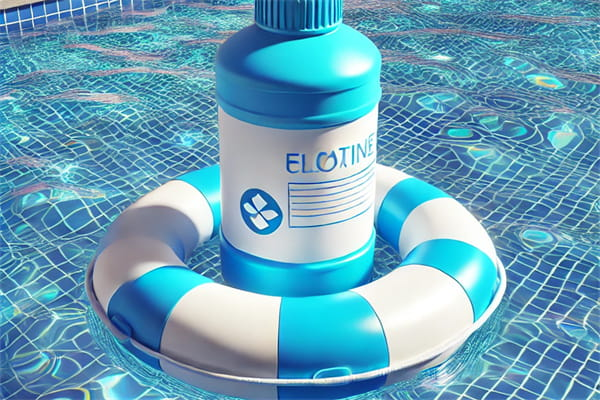Pool Chlorine Floaters play a vital role in maintaining the cleanliness and safety of swimming pools. However, when a Pool Chlorine Floater reaches the end of its lifespan, what should you do with it? This blog will explore the responsible disposal of old Pool Chlorine Floaters. Our aim is to provide practical methods and suggestions for eco-friendly disposal, ensuring we all do our part in preserving the environment.

Ⅰ. Composition of Pool Chlorine Floaters
1.Materials Used in Pool Chlorine Floaters
Pool Chlorine Floaters are made from several materials, each chosen for its durability and resistance to harsh pool chemicals.
Plastic: The primary material used in most Pool Chlorine Floaters is durable plastic. This plastic is designed to withstand prolonged exposure to chlorine and other pool chemicals without breaking down. However, its durability also means it can persist in the environment for hundreds of years if not disposed of properly.
Metal: Some floaters incorporate metal components to add weight or provide structural support. Metals such as stainless steel or coated iron are common, but they too can pose environmental risks if not recycled correctly.
Other Chemical Components: Floaters might have various chemical treatments or coatings to enhance their longevity and resistance to chlorine. These treatments, while beneficial for the floater’s performance, can complicate the recycling process.
2.Environmental Impact of These Materials
Understanding the environmental impact of these materials is crucial for making informed disposal decisions.
Plastic Pollution: Discarded plastic can take hundreds of years to decompose. It contributes significantly to landfills and can end up in oceans, harming marine life. Microplastics, resulting from the breakdown of larger plastic items, have been found throughout the food chain.
Metal Corrosion: Metals, if left to corrode, can leach harmful substances into the soil and water. This contamination can affect local ecosystems and water supplies, posing risks to wildlife and human health.
Ⅱ. Recycling and Reuse
Recycling Process
Recycling is one of the best ways to handle old Pool Chlorine Floaters responsibly.
Finding Local Recycling Centers: Start by researching local recycling centers to see if they accept the materials found in your Pool Chlorine Floater. Many communities have specialized recycling services for plastic and metal components, but you may need to contact them directly to confirm they can handle chemically treated materials.
Professional Recycling Services: If local options are limited, consider professional recycling services that specialize in pool equipment. These companies are equipped to safely dismantle and recycle floaters, ensuring that harmful substances are handled correctly.
Creative Reuse Ideas
Reusing old Pool Chlorine Floaters creatively can extend their life and reduce waste.
DIY Projects: Turn your old floater into a garden planter, bird feeder, or even a piece of yard art. For example, you can cut the floater to create a unique planter for succulents or small flowers. This not only reduces waste but also adds a personal, creative touch to your home or garden.
Home and Garden Uses: Floaters can be repurposed in various ways around the home. They can be used as storage containers for small items in the garage or shed, or even as floats for children’s pool toys.
Ⅲ. Professional Disposal Services
Using Professional Disposal Services
When recycling or reuse isn’t feasible, professional disposal services are the next best option.
Environmental Handling: Professional disposal services are trained to handle chemical-contaminated materials safely. They ensure that old Pool Chlorine Floaters are processed in an environmentally friendly manner, minimizing the risk of harmful substances entering the ecosystem.
Service Providers: Look for waste management companies that offer pickup services for hazardous materials, including old Pool Chlorine Floaters. These companies often provide detailed instructions on how to prepare your items for collection, ensuring that they are handled safely from start to finish.
Ⅳ. Regulations and Compliance
Understanding Local Regulations
It’s important to be aware of and comply with local regulations regarding the disposal of chemical-contaminated materials.
Chemical Disposal Laws: Different regions have specific laws regarding the disposal of chemicals and equipment used in pools. These laws are designed to protect the environment and public health. Make sure you understand the regulations in your area to avoid fines and ensure that you are disposing of your floaters legally.
Disposal Guidelines: Many local environmental agencies or pool equipment manufacturers provide guidelines for the proper disposal of Pool Chlorine Floaters. These guidelines often include detailed steps on how to safely prepare your floaters for disposal.
Ensuring Compliance
Following local regulations ensures that your disposal efforts are both legal and environmentally responsible.
Proper Disposal Methods: Adhering to recommended disposal methods helps protect the environment and ensures that your actions are legally compliant. This might include steps like removing any remaining chlorine tablets and thoroughly cleaning the floater before disposal.
Documentation and Reporting: If you use professional disposal services, keep records of how you dispose of hazardous materials. This documentation can be useful for future reference and ensures that you can demonstrate compliance with local regulations if needed.
Ⅴ. Conclusion
Responsible disposal of Pool Chlorine Floaters ensures that we do our part in protecting the environment. Whether through recycling, creative reuse, or professional disposal services, there are many ways to handle old floaters sustainably. By staying informed about local regulations and following best practices, we can all contribute to a cleaner, safer world.
